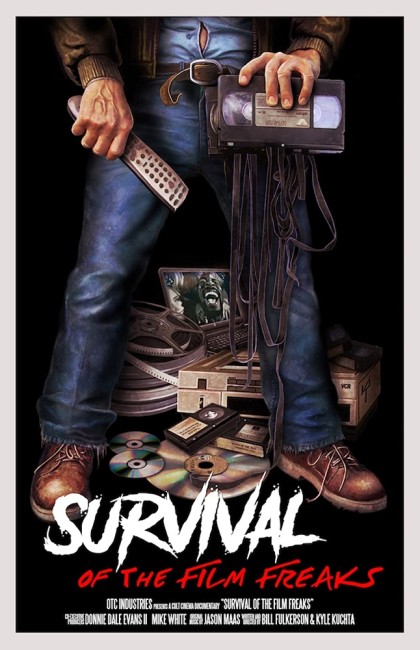
Rating:
★★
USA. 2018.
Crew
Directors/Screenplay/Photography – Bill Fulkerson & Kyle Kuchta, Music – Bill Fulkeron, Jason Maas & OK DOK. Production Company – OTC Industries.
With
James Balsamo, Jack Bennett, Kansas Bowling, Christopher Bricklemyer, Joe Bob Briggs, Greydon Clark, Luigi Cozzi, Rob Galluzzo, Jimmie Gonzalez, Chris Gore, Adam Green, Lloyd Kaufman, Dynamo Marz, B.J. McDonnell, Kurando Mitsutake, Jeff Nelson, Eric Newell, Zeke Pinheiro, William Powell, Ted Raimi, William Sachs, Stephen Scarlata, Jackson Stewart, Andrea Wolanin. Johnny Wolfnstein
Going solely by its title, Survival of the Film Freaks gives the impression of being about something like a group of fanatical film watchers holed up in a bunker as some type of apocalyptic catastrophe occurs beyond the door. In actuality, the film far more prosaically turns out to be a Documentary that explores the phenomenon of cult movies.
The immediate problem that Survival of the Film Freaks runs into is that it has difficulty defining its subject. I have a listing of Cult Movies and what I consider the defining parameters of the genre, which can be found here at Cult Movies. I can attest from writing the capsule definition there that clarifying what makes a cult film is like trying to grasp a slippery fish. Similarly, nobody in the documentary ever puts a finger on what it is that makes a movie a Cult Film as opposed to just a regular film. Something to do with a film that people celebrate after its initial life, or one that gains a life beyond its initial appeal and so on.
The other thing is that the interviewees seem woefully uninformed about the history of the cult movie. I have on my bookshelf a copy of Midnight Movies (1983) by J. Hoberman & Jonathan Rosenbaum, which does a superlative and exhaustive job of charting out the history of the cult film and the midnight movie. At most, the interviewees here toss up pulled-out-of-thin-air explanations about how people of the 1960s latched onto such films as an alternate experience, which seems a wild generalisation that lacks any real basis in research other than someone’s speculation.
Things seem on a surer footing when discussion is made of the so-called grindhouse era. (The term grindhouse never existed back in the day or was not widely used until Quentin Tarantino appropriated it with Grindhouse (2007) – and mostly refers to exploitation films that played drive-in and New York 42nd Street theatres). Some people are knowledgeable about this period and some of the interviewees were actually there. In fact, it could be said that the film becomes more knowledgeable about the cult movie phenomenon the closer it gets to the present-day.
We move from the theatrical exploitation film to the videostore of the 1980s where Cult became a specific section (largely one where anything weird would get placed, as one commentator notes). And from there we move to the growth of cable channels where films were rerun and we started to see the emergence of shows dedicated to cult movies – one of these hosts, Joe Bob Briggs, is interviewed. We then move to what is considered the new Golden Age of the cult movie – the dvd release where many titles were resurrected with the addition of extras analysing the making of each film in detail. The latter sections deal with people criticising the creating of deliberate cult movies – pointed to here is the style of the faux grindhouse film. Among this, the interviewees make the repeated assertion that film cults are found by audiences, not deliberately made by filmmakers.
The film then spends quite a bit of time debating the era of download piracy. The general upshot seems to be that it is a bad thing, which comes down to reasons such as “well if it doesn’t earn any money for my film, nobody will give me money to make more films.” Others begrudgingly acknowledge that at least people are getting to see their films, although are irritated that they are not paying customers. The sole dissenter to this is Troma head Lloyd Kaufman who says “Good – it’s hard enough work getting people to pay to see my movies.” This section is probably given more weight than it needs to be in that it is of only peripheral relevance to the topic of cult movies.
Trailer here


